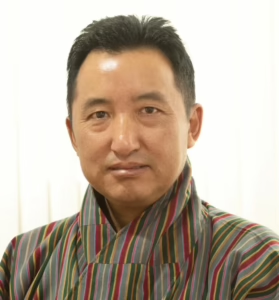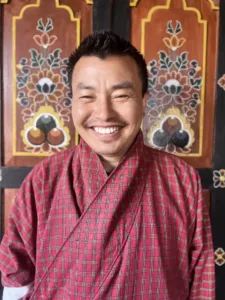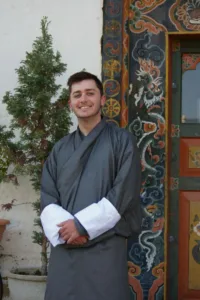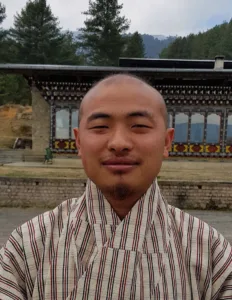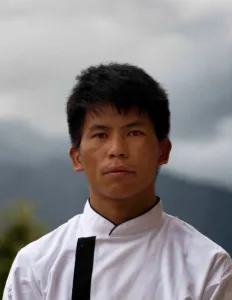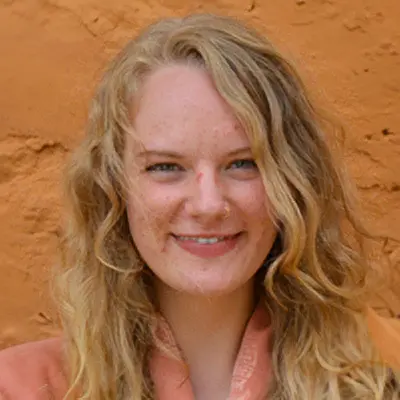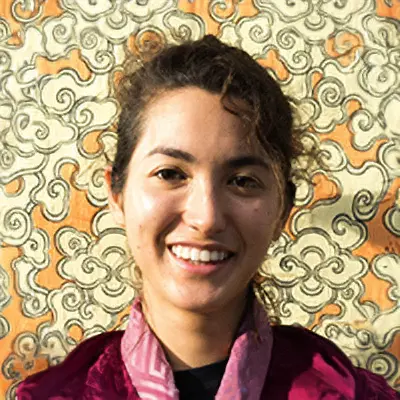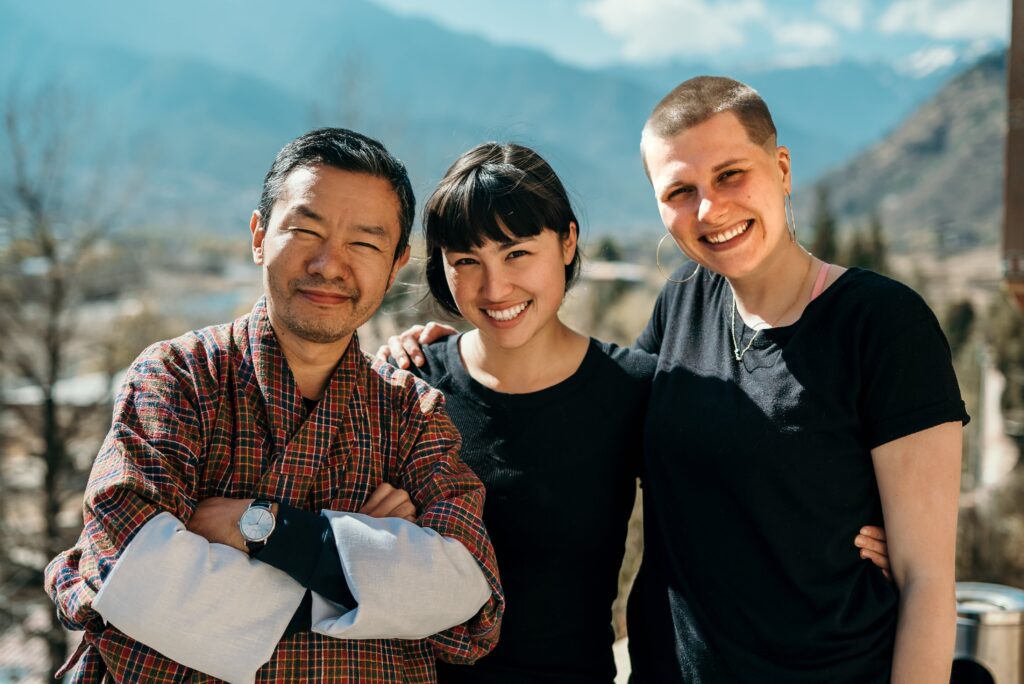Bhutan
Study Abroad in Bhutan
Have you ever wanted to spend time in the Himalayan mountains, hike through rhododendron forests dotted with brightly colored prayer flags, or observe graceful black-necked cranes and elusive mountain-dwelling takins?
Whether you’re an experienced traveler or looking for your first trip to another country, studying abroad is an important component of your college career. Living abroad gives you the opportunity to explore new places and learn about different cultures, gaining important global perspectives, discovering new things about yourself, and building lifelong friendships.
Our programs in Bhutan take place in the country’s mountains, valleys, rivers, forests, protected areas, and cultural sites. Courses and fieldwork focus on key environmental issues faced here such as natural resource and water management, climate change, and sustainable livelihoods. As the country begins to urbanize, and with the looming threat of a rapidly changing climate, Bhutan is at a crossroads. In keeping with the tenets of Gross National Happiness, the people of Bhutan must balance preserving biodiversity with securing their economic futures. SFS works in partnership with the Bhutanese government and the Bhutan Ecological Society to provide much-needed data that informs sustainable conservation and development policies and climate adaptation strategies.
Programs
Himalayan Environment and Society in Transition
See Program Costs
Program Costs
- Tuition
- Room & Board
- Total
Forests in the Land of the Thunder Dragon
See Program Costs
Program Costs
- Tuition
- Room & Board
- Total
Where You'll be Living
The Center is located at one end of the stunning Paro Valley, at the base of a towering ridgeline dotted with Buddhist monasteries. Campus is a small cluster of buildings designed in the traditional Bhutanese architectural style. A pleasant walk brings you to the markets, shops, and cultural events of Paro Town.
- Dorm living with two to four student rooms
- Classroom and dedicated study spaces
- Kitchen and dining hall, and on-site cooking staff
- Student lounge and ping-pong loft
- Verandas with scenic views of the valley
- Hiking trails and local roads for running
Know before you go
Click on each dropdown to explore details about life at this Center, and determine if it’s the right fit for you.
Program experience
Living Conditions & Daily Life
Students reside in shared accommodations at the SFS Center in Paro, with communal dining facilities where meals are provided. The structured schedule typically runs Monday through Saturday and includes multi-day field trips that may fall on weekends. Evenings and Sundays generally offer personal time while in Paro. A daily curfew is enforced throughout the program.
Due to Bhutanese visa restrictions, independent travel is limited. Students often explore Paro’s hiking trails and city areas during their free time. A mid-semester break is offered during the Spring, Summer, and Fall programs, during which students may travel independently within Paro and Thimphu. The center remains open during this time.
Physical Readiness
Fieldwork involves physically demanding activities such as trekking in mountainous terrain, camping in high-altitude regions, conducting field research, and participating in cultural excursions. Semester students participate in several camping trips and may also engage in brief homestays where they share space with multiple people.
The region’s high altitude, steep terrain, and changing weather (from sun to cold rain) add to the physical challenges. Accessibility for students with mobility impairments is very limited. Summer sessions typically include fewer camping and hiking excursions but still require active outdoor participation.
Travel & Transitions
Students are based at the SFS Center but frequently travel to field sites and communities via van or on foot. Travel often involves long, winding road trips and overnight excursions with basic accommodations or tent camping. Schedules can shift frequently due to local conditions, requiring flexibility and adaptability.
Location & Culture
Program Location & Natural Environment
Paro is a mountain town nestled in the Himalayas, offering serene natural beauty alongside vibrant cultural traditions. Students experience rapid weather changes, high altitudes, strong sun exposure, and varying temperatures during fieldwork in both natural and urban settings.
Cultural & Linguistic Differences
Bhutan’s rich Buddhist traditions shape daily life, from local festivals and religious practices to market interactions and etiquette. Students engage with communities that observe traditional gender roles and norms, including modest dress and social behavior.
While English is widely taught and all SFS coursework is conducted in English, Dzongkha is the national language, and English proficiency may be limited in rural areas. Students are not expected to have language skills prior to arrival, and language classes are provided to support daily interaction.
health
Allergies & Dietary Preferences
Traditional Bhutanese cuisine often features chilies, dairy, and spices. Dishes like ema datshi (chili and cheese), momos, and red rice are staples. Students do not have access to a kitchen to prepare their own meals but may dine at local establishments occasionally.
Cross-contamination accommodations for advanced allergies abroad may not be feasible. Students with severe or life-threatening allergies and/or strict dietary requirements must consult with medical professionals and [email protected] before applying.
Required Vaccinations & Health Care
SFS does not require specific vaccinations for this program. The program will visit a malaria-risk region for approximately 4 days during the semester programs. Students are strongly advised to consider malaria prophylaxis during this period and may choose to do so based on medical recommendations. For additional recommendations for vaccinations and medications, consultation with a travel medicine professional is strongly advised before departure.
The program briefly travels to regions where malaria is present, and participants may choose to take malaria prophylaxis due to possible limited exposure.
Basic medical services are about 10 minutes from the center, and advanced care is approximately 1.5 hours away. During excursions, students may be 10+ hours from basic care, and in emergencies, air evacuation to Bangkok, Thailand may be necessary.
Routine in-person medical and counseling services are not feasible during the program. Students must bring a full supply of any prescription medications, including psychotropic medications, for the entire duration of the program, as local refills may not be available without prior arrangements.
PRogram Costs
Study abroad is an investment in yourself – you’ll return home with new experiences, skills, knowledge, and friendships that will stay with you for the rest of your life. SFS program costs cover a variety of expenses, including:
- Pre-program advising and on-site orientation
- Tuition and research fees
- Housing at the field station and on excursions
- Daily meals and snacks
- Airport transfers (for arrival/departure)
- Field excursions and cultural activities
- Student success and wellness team on site
- 24/7 mental health and well-being support
- Emergency evacuation and repatriation insurance
- Official transcript processing
Financial Aid
We know cost can be one of the biggest barriers to studying abroad. At SFS, we’re committed to making our programs accessible to students which is why we award a generous amount in need-based financial aid each year. Our Admissions Team has worked with thousands of students and are here to answer your questions about the SFS aid process, aid available through your home school, and funding from external sources.
SFS Financial Aid: Need-based aid packages typically consist of a combination of scholarships, grants, and zero- and low-interest loans. SFS matches Federal Pell Grant funding for students applying to an SFS semester program.
Home School Aid: Be sure to ask your home school study abroad office or financial aid office what financial aid resources might be available to support your study abroad experience.
External Funding Opportunities: Organizations such as the Fund for Education Abroad or the Gilman International Scholarship Program award scholarships to students going abroad. These can be a great opportunity to reduce the cost of your program even more.
Research
In collaboration with our in-country partners, UWICER and BES, our research at the SFS Center for Climate and Sustainable Futures focuses on enhancing the condition of forest, river, and mountain ecosystems while balancing modernization and cultural preservation. Students contribute to this collaborative research agenda in several priority areas including mountain biodiversity and biogeography, climate change, sustainable forestry, conservation biology, water resources, socioeconomic development, human well-being, and public policy.
Our research focuses primarily on the following themes:
- Climate change
- Gross National Happiness
- Mountain ecology and biodiversity conservation
- Forest management
- Himalayan biogeography
- Agriculture, food systems, and development
- Tourism
Community
SFS is an active part of the Bhutanese community, where we have been operating programs for 10 years.
We have built long-term, collaborative relationships in the communities around the Center, and developed our research plans based on the environmental issues they and the surrounding ecosystems face. Throughout the program, students participate in a short homestay, join volunteer projects like stream clean-ups and environmental education programs, plant trees, attend tshechus (festivals), and play sports with Bhutanese students and monks.
At the end of each semester program, we host a Community Research Night where select students will present their research findings to the community. SFS research data is shared with the community, local NGOs, and the Bhutanese government.
Meet the Bhutan Team
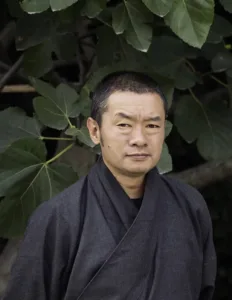
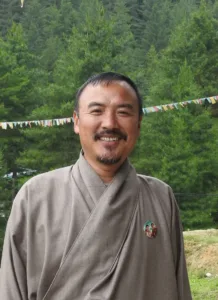
Sonam Phuntsho
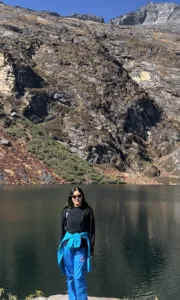
Kuenga Wangmo, PhD
